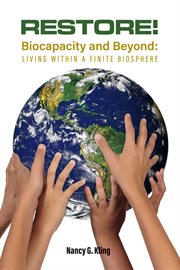Nonfiction
eBook
Details
PUBLISHED
Made available through hoopla
DESCRIPTION
1 online resource
ISBN/ISSN
LANGUAGE
NOTES
The underlying premise of this book is as follows, taken from the introduction: "Every substance and raw material required for our existence comes from Earth's biosphere, and all depleted or discarded substances and materials are returned to the biosphere as waste to be absorbed or recycled by Earth's ecological systems. These materials and ecological systems are the foundation upon which all economic activity and every other human endeavor are based. Consequently, the ability of Earth's ecological systems to provide, replenish, absorb, and recycle these materials establishes the limit for human enterprise." The book is an accessible scientific explanation and assessment of Earth's fundamental biogeochemical systems and natural resources. The book explores the functioning of the carbon, nitrogen, oxygen, water, methane, and phosphorus cycles, along with critical natural resources such as water, soil, rare earth minerals, phosphates, reactive nitrogen, and arable land. For each cycle and resource, the book describes specifically how human activities are disrupting these ecological cycles and depleting and damaging these resources. Through the course of the book, the reader learns that linear economic growth, injurious land use practices, and population momentum are the primary global drivers that have led us to exceed the biogeochemical boundaries of our Earth systems. The book closes with the principles of the steady-state economy of H.E. Daly, along with economic and natural resource accounting models that could provide the tools for quantifying and accounting for the environmental impacts of human enterprise. The book closes with the following: "We are at a juncture in the history of our planet and our species where we must return to thinking about our economy and sustainability as fully interdependent factors and begin to measure our economic progress in ways that account for our environmental and social impacts. The road to global economic, social, and environmental well-being will be paved with policies that ensure that production, consumption, and population remain well within our planetary boundaries."
Mode of access: World Wide Web







